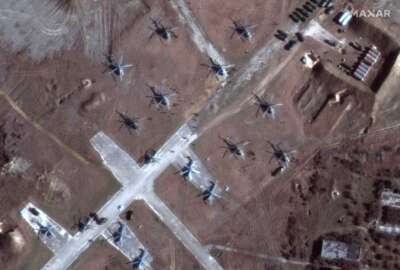The National Geospatial-Intelligence Agency is continuing its push to take advantage of unclassified commercial data sources, with plans to launch a competition for commercial GEOINT data services next month.
Vice Adm. Frank Whitworth, director of NGA, said the agency will release a request for proposals for the “Luno A” program in January. NGA plans to make awards to multiple vendors. The contracts will help NGA acquire commercial GEOINT object detections, and leverage industry analytics and automation.
“I wish I could tell you the amount, but let’s just say it’s significant,” Whitworth said Tuesday during the Defense Department Intelligence Information System (DoDIIS) conference in Portland, Ore.
NGA released a draft RFP for the Luno A contracts this fall. The goal of the effort is to “transform” NGA’s approach to geospatial information, while expanding access to both data and services.
Notably, NGA had forecast plans to keep the resulting contract work on unclassified networks.
“The objective of this effort is to acquire products, data, and/or services produced from unclassified commercial GEOINT on unclassified networks, not to acquire a technology or capability to install and manage on classified networks,” the draft RFP stated. “NGA expects industry to leverage unclassified sources and analytical capabilities available in the commercial marketplace to produce these products, data, and/or services.”
As the commercial space industry continues to grow, NGA is increasingly turning to unclassified, commercial imagery and other services, rather than highly sensitive government sources. A 2021 strategy spelled out how NGA analysts should turn to commercial imagery as a “primary source” for intelligence analysis.
Whitworth also said NGA is partnering with the National Security Innovation Network to launch a new initiative in early 2024 called the “Global Fishing Forecast Challenge.” The goal is to use unclassified data to forecast illegal, unreported and unregulated fishing activity. Ten teams will compete for a $500,000 prize, with each team receiving at least $25,000 for their solution.
“I believe finding new data sources and methods to forecast the movement of what are considered dark vessels would be a big plus there,” Whitworth said, referring to ships that don’t broadcast their locations using the automatic identification system.
NGA sketches out major AI efforts
NGA is also moving forward with multiple artificial intelligence initiatives, including a new “frontier project” under the Defense Department’s High Performance Computing Modernization Program.
Whitworth said the NGA project aims to develop “the largest and most advanced AI model for Earth observation based querying.”
“It’s a four year effort that will involve millions of hours of computing time, along with dedicated systems administration support, and will advance the state of the art of AI,” he said.
Last year, NGA took over administration of DoD’s premier AI effort to date, Project Maven. The program has developed machine learning and computer vision models to detect objects and conduct other types of analysis relevant to GEOINT missions.
Now just called “Maven,” Whitworth said it officially became an NGA program-of-record last month, further institutionalizing what was previously a temporary project. The program is a critical part of NGA’s future, officials have said, because AI and machine learning will be needed to sufficiently analyze a quickly expanding reservoir of GEOINT data.
“It can quickly fuse enormous amounts of data from across disparate datasets, teeing up meaningful opportunities,” Whitworth said. “We’ve worked hard with the combatant commands to integrate AI into their workflows, accelerating operations and decision speeds. We’ve also increased the fidelity of targets, improved geolocation accuracy, and refined our test and evaluation process.”
Whitworth said NGA is also committed to ensuring the “ethical and responsible use of AI.” He said the agency has established what it calls a “GEOINT Responsible AI Training” program, referred to as “GREAT.”
Copyright
© 2024 Federal News Network. All rights reserved. This website is not intended for users located within the European Economic Area.





